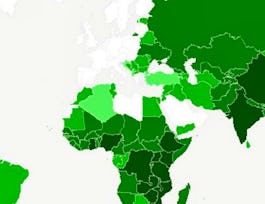This course was developed by the reference network for the European Regional and Local Health Authorities (EUREGHA), Agència de Qualitat i Avaluació Sanitàries de Catalunya (AQuAS), and Mental Health Europe (MHE) as part of the research project 'Pan-European Response to the Impacts of the COVID-19 and future Pandemics and Epidemics' (PERISCOPE, https://www.periscopeproject.eu/). Funded by the European Commission Research Funding programme Horizon 2020 under the Grant Agreement number 101016233, PERISCOPE investigates the broad socio-economic and behavioural impacts of the COVID-19 pandemic, to make Europe more resilient and prepared for future large-scale risks.



Strengthening territorial response for better health

Instructor: Marco Brambilla
Sponsored by Taipei Medical University [C4CB]
Recommended experience
Recommended experience
Skills you'll gain
- Transportation, Supply Chain, and Logistics
- Digital Transformation
- Health Care Administration
- Health Administration
- Community Mental Health Services
- Psychology
- Mental Health
- Clinical Psychology
- Technology Strategies
- Supply Chain Management
- Mental and Behavioral Health Specialties
- Procurement
- Health Systems
- Behavioral Health
Details to know

Add to your LinkedIn profile
13 assignments
See how employees at top companies are mastering in-demand skills


Earn a career certificate
Add this credential to your LinkedIn profile, resume, or CV
Share it on social media and in your performance review

There are 4 modules in this course
During a severe emergency like a pandemic, it is not so important how to buy but rather what to buy immediately, assuming that the imminent danger still allows extraordinary and fast procurement procedures. And there are things you cannot do without. Deeping dive into the experience of AReSS Puglia (the Strategic Agency for Health and Social Care of Apulia region, IT), this module aims to explore four main procurement lines that can be crucial for health authorities in planning and setting up a timely and effective response to the outbreak of a health emergency.
What's included
4 videos2 readings4 assignments
This module explores digital transformation and change management in the context of the COVID-19 pandemic, and provides an introduction to evaluating digital health technologies. The module will begin with a lecture in interview format on digital transformation, with a particular focus on the Catalan region. Some of the topics covered in this interview will include: 1)The shift towards digital operations: what’s new? 2) What is change management and why is it important in the current context; 3) Guidelines and procedures for policymaking: one size fits all? 4) The importance of the cultural environment; 5) The role of citizens. A second lecture will describe how digitalisation has transformed the evaluation of medical technologies. First, we will revise a few basic aspects of health technology assessment. Then, we will discuss evidence-based evaluation of digital health products (apps, sensors, wearables, etc) and explain what are some of its specific requirements. The lecture will highlight the importance of having a formal assessment across technical, clinical, usability, and cost domains. To that end, we will review the existing landscape and gaps, and introduce some evolving responses and new approaches.
What's included
2 videos2 readings2 assignments
Nowadays, structured and sustainable Euregional collaboration in the field of public health is crucial. Based on the experience gained by euPrevent and GGD Limburg in dealing with cross-border cooperation, this module will draw attention to three different perspectives: Research, stressing the importance of cross-border data collection and analysis accessible to professionals and the general public; Policy, catching the perceptions of regional stakeholders on national measures across the borders; Citizens, with a focus on their role in cross-border political design and decision-making process.
What's included
3 videos3 readings3 assignments
This online training will focus on mental health and specifically tackling stigma. The training will first provide an overview of mental health, followed by an outline of the complexities of mental health and stigmatisation. The training will also clarify why people can unintentionally reinforce negative stereotypes and be stigmatising, because of the language they use when discussing mental health. The subsequent section will be delivered by mental health experts and will be an opportunity to hear directly from experts by experience on the harmful effects of stigma on mental health. The concluding portion of the module will address the relevant policy interventions and implementations necessary to make such changes a reality.
What's included
5 videos4 assignments
Instructor

Offered by
Why people choose Coursera for their career




Recommended if you're interested in Health

Politecnico di Milano

Johns Hopkins University

University of Michigan

The State University of New York

Open new doors with Coursera Plus
Unlimited access to 10,000+ world-class courses, hands-on projects, and job-ready certificate programs - all included in your subscription
Advance your career with an online degree
Earn a degree from world-class universities - 100% online
Join over 3,400 global companies that choose Coursera for Business
Upskill your employees to excel in the digital economy


